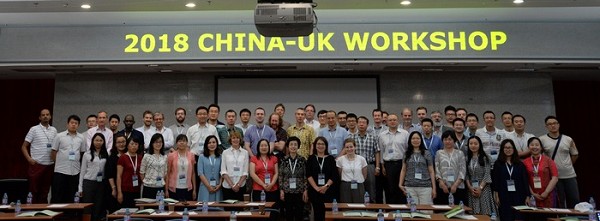The 2018 China-UK workshop was held at the Institute of Microbiology, Chinese Academy of Sciences (IMCAS) on June 3-7, 2018. More than 50 experts from China and abroad in the areas of carbon bio-fixation, gas fermentation, Clostridium metabolism and synthetic biology attended the workshop and exchanged the latest research progress and innovation.
The theme of the workshop was "Carbon recycling: converting waste derived GHG into chemicals, fuels and animal feed". During the workshop, Chinese and foreign scholars shared the latest academic or industrial development on topics in the screening of carbon fixation microorganism, genome sequencing, genetic manipulation tools development, system metabolic engineering transformation, artificial carbon fixation pathway and system creation, waste and biomass gasification, syngas production chemicals, carbon dioxide electric conversion, raw carbon fixation process development and industrial implementation status, and etc.
The meeting discussed comprehensively about the current scientific and technical problems in carbon recycling, and had in-depth exchange of views on how to identify the key issues, overcome the bottlenecks and advance the development in related research areas.
The workshop enhanced the communications between China and UK in the field of biotransformation of C1 resources, and laid important foundation for further scientific research cooperation between both parties in the future.
In the past decades, global economic development has been heavily relying on the consumption of fossil fuels like petroleum and coal resources.
However, fossil fuel based industrial processes like petroleum refining, coal coking, steel smelting would generate large amount of waste gases, which are rich in CO and CO2. The release of these waste gases brought serious environmental concerns, while at the same time led to waste of carbon resources in the form of C1 gas, such as CO2, CO and CH4.
As described in the report of the 19th National Congress of the Communist Party of China, China will create a market-based innovation system for green technology, spur the development of energy-saving and environmental protection industries, clean manufacturing industries and clean energy industries. China will also promote a revolution in energy production and consumption, and build an energy sector that is clean, low-carbon, safe, and efficient.
The development of bio-fixation technology in C1 gases will reduce greenhouse gas emissions, promote "carbon cycling". It will also transform the low value industrial waste gases into high value products, therefore turning the waste into treasure, achieving the extension of the industrial chain, and making contributions to the Beautiful China initiative.
Compared with chemical catalysis, the main advantages of using microorganisms to convert C1 gases are: high catalytic selectivity, lower energy consumption, more safety and low requirements for gas composition. Therefore, efficiently convertingC1 gases into fuels and chemicals through developing microbial cell factories and developing gas fermentation processes will start a new route to solve the global resource and energy problems and contribute greatly to sustainable development of industry.
In 2013, the Chinese Academy of Sciences and the UK Research Council launched the synthetic biology exchange project, which aimed to promote joint-researches on C1 gas fermentation between China and UK. In addition to technical personnel exchanges, both parties also plan to hold regular academic seminars to promote exchanges and cooperation on multi-levels. On the 2016 China-UK workshop, Shanghai, December 2016, the delegates of both parties had active discussions and exchanges themed on "green biological manufacturing based on C1 gas".
This workshop was co-sponsored by the University of Nottingham and CAS-TWAS Centre of Excellence for Biotechnology.
After the meeting, more than twenty delegates from University of Nottingham and University of Southampton paid a visit to the Key Laboratory of Microbial Physiological and Metabolic Engineering of the Chinese Academy of Sciences.
